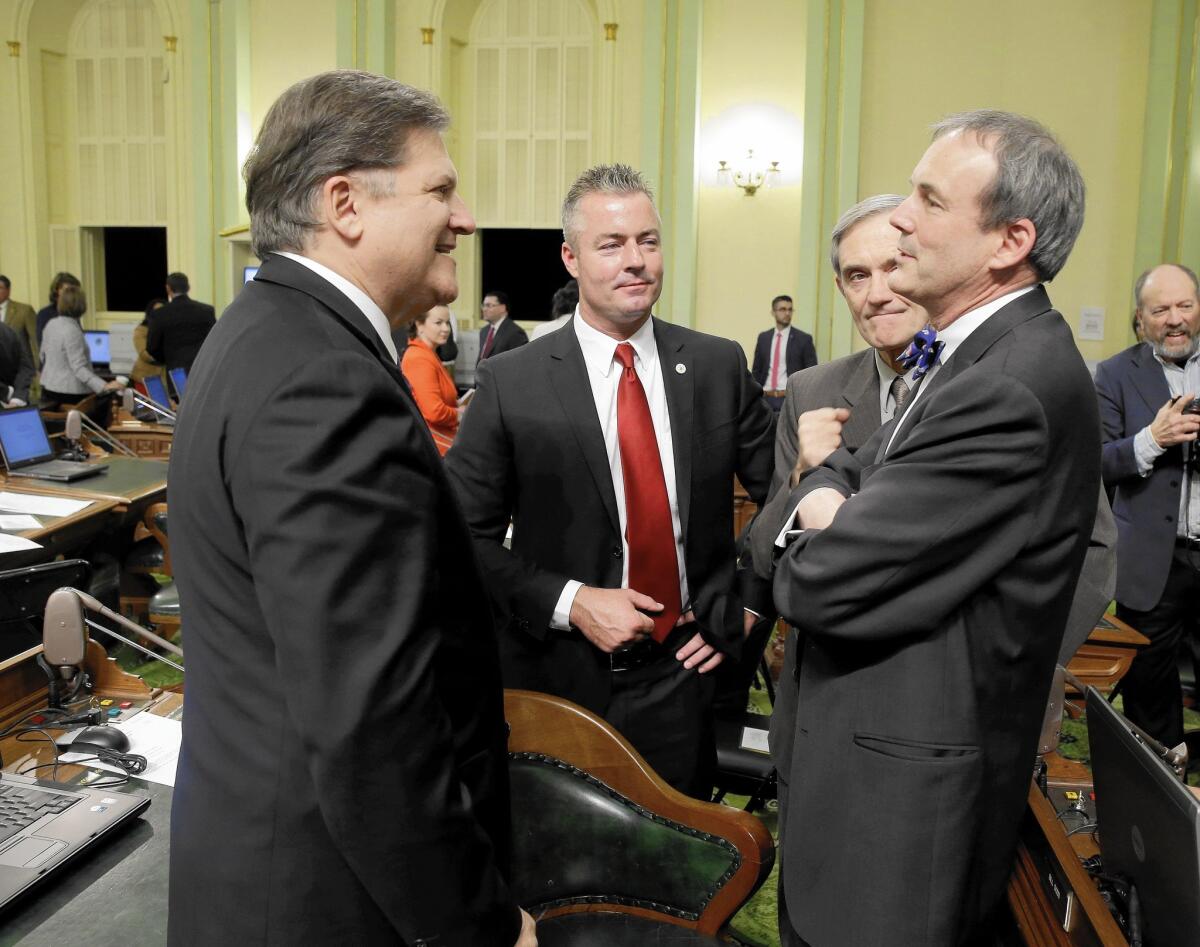Capitol Journal: Don’t extend tax-the-rich Prop. 30; overhaul the whole tax system

The latest numbers are in, and they show that Gov. Jerry Brown’s tax increase is performing as advertised — generating billions by soaking the rich.
The data also point to the continuing need for an overhaul of California’s tax system to make it less dependent on the unreliable super-wealthy.
But very few politicians — especially Brown — want to touch this subject for fear of goring oxen and being accused of kowtowing to the rich.
The issue has little to do with what’s fair or isn’t, however. It’s about stabilizing the state tax system so it reliably produces enough money for education, social services, infrastructure and public safety in good times and bad.
Right now the state treasury is overflowing with cash as the economy rebounds. But there’ll be another recession. That’s certain. And in the last one, lest we forget, the tax flow slowed to a trickle, the state ran huge deficits and vital programs were slashed. College tuition soared.
No, Sacramento really could not have cut more.
And don’t blame the bullet train. Yes, it’s a $68-billion project. But only $1.2 billion in state and federal money has been spent.
Brown’s Proposition 30, which voters passed in 2012, is expected to produce at least $8 billion for the fiscal year starting July 1, according to the state Finance Department. Of that, $6.5 billion will come from higher income taxes on the rich and $1.5 billion from a quarter-cent sales tax increase on everyone. Those projections will be updated when Brown revises his budget proposal in mid-May.
The most significant numbers, however, came this week from the state Franchise Tax Board, which collects the personal income tax. The latest data is for 2013, the second year of Proposition 30. The measure passed in November 2012 but was sneakily retroactive to January of that year, raising the top income tax rates to 13.3% from 10.3%
The data show:
• The top 1% accounted for 21.8% of California’s adjusted gross income. But they kicked in disproportionately 45.4% of the state’s personal income tax.
Actually, that’s a 5.2 percentage point decrease from 2012, when many rich people shifted investment income — capital gains — into that year to avoid federal tax hikes that were taking effect in 2013. But it’s a 4.3 percentage point increase over the tax slice of the top 1% in 2011, the year before Proposition 30 took effect.
To be in the top 1% in 2013, you had to earn at least $501,478.
• The top 10% earned 49% of California’s income in 2013, but paid 78% of the tax receipts. To be in the highest 10%, you had to make at least $141,573.
All this produces extreme tax volatility because incomes of the rich fluctuate wildly during periods of boom and bust, depending on whether investments soar or sour.
Proposition 2, Brown’s rainy day fund approved by voters last year, should help slightly by committing some excessive capital gains revenue to a budget reserve. But already there’s talk in the Legislature about how to get around that.
The problem is that state government relies too heavily on the income tax. It’s expected to produce about 66% of general fund revenue in the next fiscal year; the sales tax, only 22%. That’s a huge change from back in 1950, when the income tax supplied 10% of the revenue and the sales tax, 60%. In those days, California’s tax system meshed with the times.
Today, the tax system is very moldy. California’s economy has shifted from mainly manufacturing to service. Yet the sales tax still applies only to retail goods (auto parts) and not service (auto repair labor). There’s no sales tax on Dodgers tickets, only on baseballs. There’s none either on tax accounting, just on the software for do-it-yourself calculating.
But this subject is taboo for most jittery politicians.
Not for a couple, however: new Democratic state Controller Betty Yee and freshman Sen. Bob Hertzberg (D-Van Nuys). Both have been around politics for decades, Yee as an elected Board of Equalization member and Hertzberg as an Assembly speaker.
Yee recently appointed a panel of experts to examine numerous proposals for widening the tax base — perhaps lowering some tax rates while extending the sales tax to services.
She and Hertzberg see a ripe opportunity with so many Democratic interests pushing to extend Proposition 30 beyond its scheduled phase-out between 2017 and 2019. Both think taxes should be reformed instead.
“There’s a lot of angst in the Legislature” about losing the tax hikes, she says. “But now is when we should find a way to stabilize the system. We may need to give up a little progressivity on the income tax and spread the base.”
That last sentence is not the kind of common-sense thinking you normally hear a Democrat expressing out loud.
Hertzberg is trying — so far unsuccessfully — to build a coalition for reform legislation. “It’s the hardest thing I’ve ever dealt with,” he says.
“Sacramento is not a marketplace of ideas. It’s a place where advocates are unwilling to sit down and discuss how to fix California. They care only about their little slice of the pie.”
Proposition 30 should not be extended. The tax system should be rebuilt. It’s too old and wobbly to support a vibrant state.
Twitter: @LATimesSkelton
More to Read
Start your day right
Sign up for Essential California for news, features and recommendations from the L.A. Times and beyond in your inbox six days a week.
You may occasionally receive promotional content from the Los Angeles Times.







